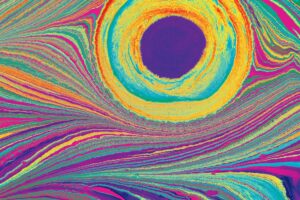The intriguing intersection of psychedelic substances and mental well-being is an area of growing scientific interest. As traditional treatment options fall short for many living with mental health conditions, psychedelic therapy offers promise of transformative psychological healing. Though once regarded with skepticism, a surge of rigorous psychedelic research in recent decades has begun to unveil the promising therapeutic potential of these mind-altering compounds.
Psychedelic substances are compounds that induce a state of altered consciousness characterized by enhanced imagination, perception, and insightful thoughts. They include chemicals such as psilocybin (found in magic mushrooms), Lysergic acid diethylamide (LSD), mescaline (found in Peyote cactus), and 4-phosphoryloxy-N,N-dimethyltryptamine (DMT), amongst others.
Research indicates that these psychedelic experiences may hold therapeutic value in numerous mental health conditions, including anxiety, depression, post-traumatic stress disorder (PTSD), and addiction. Scientists suggest that the efficacy of psychedelic therapy lies in its potential to induce a state of heightened psychological malleability, thereby amplifying the effectiveness of structured therapy sessions.
A 2019 study by Imperial College London substantiates this assertion. Participants suffering from treatment-resistant depression showed marked improvement in their mental well-being after undergoing psilocybin-assisted therapy. Researchers observed that the psychedelic substance facilitated a drastic mental shift, triggering profound, lasting changes in the patients’ outlook and attitudes.
This breakthrough psychedelic research provides compelling evidence of the extraordinary potential of these substances to facilitate lasting psychological healing. By inducing a state of “temporary ego dissolution,” psychedelics seem to help individuals transcend their ingrained thought patterns and emotional responses, enabling them to view their lives from a radically fresh perspective.
But how exactly does this happen? Research suggests that these substances significantly alter communication patterns in the brain, disrupting the typical psychological structures that dictate our perceptions and behaviors. Essentially, they ignite a mental ‘reset’ allowing individuals to overcome entrenched, harmful patterns of thought and behavior.
Moreover, the benefits of psychedelic therapy extend beyond individual mental health issues. It also offers promise for improving general mental well-being, enhancing emotional openness, wisdom, and creativity, providing deeper personal insights, and facilitating more positive, satisfying interpersonal relationships.
Nevertheless, while the potential benefits of psychedelic-assisted therapy are promising, it’s crucial to acknowledge the risks involved. Like all treatment options, this form of therapy carries potential adverse effects, including drug-induced psychosis in certain susceptible individuals and unpleasant psychedelic experiences, inducing anxiety and fear.
For psychedelic therapy to be genuinely transformative, it needs to be carefully administered and monitored within a safe, controlled environment under professional supervision. Self-medication or recreational use of psychedelic substances without adequate support can lead to harmful, even dangerous outcomes, underscoring the necessity for responsible use and regulation.
The burgeoning field of psychedelic research is providing fresh hope and clinical evidence for those struggling with mental afflictions. While we’re only at the beginning of understanding the extent of the therapeutic potential these substances possess, it is clear they offer unique avenues for psychological healing and personal growth.
In conclusion, it’s fair to say that the relationship between psychedelic substances and mental health is complex yet promising. Despite the complexities and risks, the prospect of highly effective treatment options capable of transforming lives is an encouraging new frontier in mental health care. As research in this vibrant field continues, it will undoubtedly uncover further thrilling insights into the psychedelic realm and its potential for healing mind and spirit.






